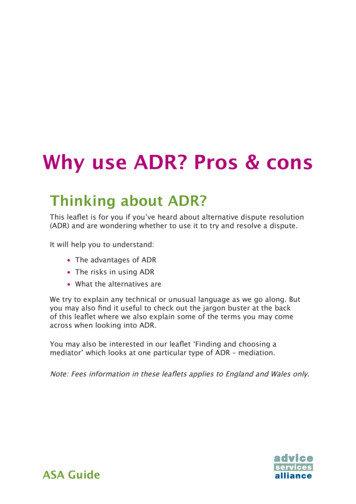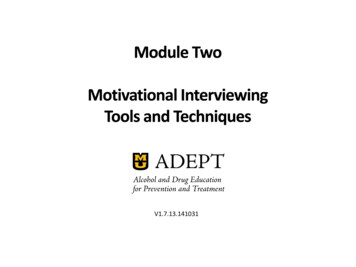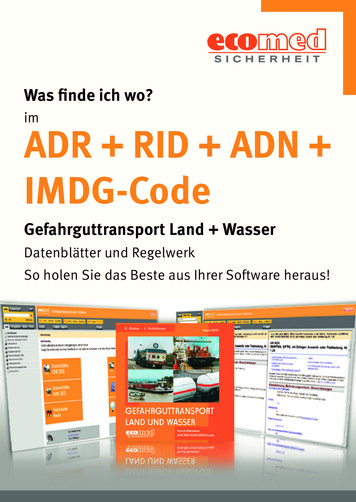
Transcription
Why use ADR? Pros & consThinking about ADR?This leaflet is for you if you’ve heard about alternative dispute resolution(ADR) and are wondering whether to use it to try and resolve a dispute.It will help you to understand: The advantages of ADR The risks in using ADR What the alternatives areWe try to explain any technical or unusual language as we go along. Butyou may also find it useful to check out the jargon buster at the backof this leaflet where we also explain some of the terms you may comeacross when looking into ADR.You may also be interested in our leaflet ‘Finding and choosing amediator’ which looks at one particular type of ADR – mediation.Note: Fees information in these leaflets applies to England and Wales only.ASA Guide
ContentsBefore you start - what are your alternatives? . 3Reasons for using ADR . 4Risks in using ADR . . 7The cost of ADR . 9Three important points to consider . 11Jargon buster. 132Why use ADR? Pros & cons - ASA guide
What is ADR?ADR is the name used for different ways of solving a dispute. For example, mediation,arbitration, adjudication and ombudsmen are all types of ADR. In many circumstancesthey are alternatives to going to court – which is why they are sometimes known as‘alternative dispute resolution’.At Advice Services Alliance we like to use the term ‘appropriate dispute resolution’,because we believe that it’s important to use the most appropriate way of resolvinga dispute. What’s appropriate depends on a lot of things – your circumstances, thetype of dispute, the urgency of the problem, the cost etc.Find out more about different types of ADR in the Jargon Buster.Before you start - what are your alternatives?When you think about whether to use mediation or another typeof ADR to sort out a dispute, it’s helpful to think about your otheroptions. Are you considering ADR because you think it will be betterthan the alternative? If so, do you know what those alternatives are?Or are you wondering whether to try ADR because you don’t seem tohave any other choices? Below we outline your main options:Doing nothingADR might be an alternative to doing nothing. Sometimes doingnothing is the right choice for you. You might feel that the problemis just not worth spending more time or money on, or that it willeventually sort itself out. Or you might feel doing something couldmake matters worse, and that you can live with the problem as it is.The important thing is that you have thought about it and weighedup the pros and cons of doing nothing, and you know what youroptions are.Important: If the problem is serious or urgent, however, get advicebefore making your decision. There are some problems that justcan’t be left to themselves.Going to courtADR might be an alternative to going to court or to a tribunal. If so,you should think about which process might be cheaper, which mightbe quicker, which you would find less stressful, and what outcomeyou might end up with. If someone is threatening to take you tocourt, you can consider whether you want to suggest some kind ofADR rather than a court hearing. You should get advice about yoursituation before deciding whether to go to court or not.Why use ADR? Pros & cons - ASA guide3
Negotiating and working it out yourselfADR may also be an option for trying to resolve a problem wherethere are no formal alternatives. In neighbour disputes, for example,there may not be an easily available legal remedy. If this is the case,you should think about whether attempting ADR is better than aninformal chat with your neighbours, or in fact doing nothing at all.Being forced to consider ADRYou always have a choice about whether or not to use ADR, but youmight not have a choice about considering it. If you are going tocourt to deal with a family dispute such as divorce or separation, forexample, you are required to meet with a mediator first and considermediation. In future this might also be true if you are going to courtwith a non-family dispute, such as a consumer claim. And if you havea dispute covered by a contract that requires you to use arbitration,you might not have a choice.Either way, over the next few pages we outline some of the commonlyagreed pros and cons of different types of ADR.Reasons for using ADRThere are ongoing debates about the pros and cons of differentADR options. When thinking about the claims that are made for anydispute resolution option, do bear in mind who is making the claim,and why. Some of the claims are true, but only in some contexts.CheaperMediators will commonly claim that mediation is quicker and cheaperthan going to court. Mediation can be much cheaper than taking legalaction. However, research published by the government shows thatthis is not always the case. As you might expect, when mediationended in a settlement, people thought it was quicker and cheaperthan going to a full court hearing. When the mediation didn’t end in asettlement, they thought it just added time and costs to the process.There are fees for making a claim in court. Currently, in England andWales, fees for making a small claim range from 35 (for a claim upto 300) to 120 (for a claim up to 5,000). The fees for makinga claim using the courts’ Money Claims Online service are slightlycheaper.4Why use ADR? Pros & cons - ASA guide
If your claim is not for money, but for something else – for example,if you are asking the court to tell someone to do something or stopfrom doing something – the fee is 175.Remember that if you can’t afford to pay the court fees, you mightbe entitled to a reduction in the fee or even having the fee waived soyou don’t pay it at all. This is important, because (unlike the courts)most mediation providers won’t reduce their fees if you can’t affordto pay.Also remember that there may be other fees involved in using thecourts – including a fee for allocating the case and a fee for enforcinga payment ordered by the court.Top tipFind out what the costs of taking out a court claim would be, then comparethese to the ADR options. If you receive certain benefits then you don’t have topay court fees, and if you are making a small claim then you won’t be asked topay for the other side’s legal costs. So the cost of going to court might be lessthan paying for mediation.And don’t forget that most court cases don’t actually go to a hearing before ajudge but instead end in a settlement. This, too, is likely to be cheaper than afull court hearing. So a more realistic cost comparison might be between you(or your adviser) negotiating a settlement directly with the other side, andchoosing to go to a mediation session where you can tell your own story.Some forms of ADR are free to use – such as ombudsmen schemes. These arelikely to be cheaper than taking legal action. But tribunals are also free – fornow. There are proposals to charge fees for employment tribunals, but othertribunals make no charge for lodging an appeal.QuickerSome forms of ADR can be quicker than going to court. If you areinvolved in a small claim in court, for example, your case can go tomediation sooner than a hearing can be arranged.Other forms of ADR, such as ombudsmen investigations, can take along time. So if the matter needs to be resolved urgently, get advicefrom an adviser before deciding. For example, you might need to goto court to get an injunction to stop someone doing something, ifyour safety or home is at risk.Why use ADR? Pros & cons - ASA guide5
Here are some of the commonly agreed benefits of ADR:Not adversarialGoing to court can risk making a bad situation worse. That’s becausethe legal system is adversarial – it puts one side against the other,and at the end there is a winner and a loser. Using mediation, whereyou talk to each other to find a solution you can both live with, canhelp preserve an ongoing relationship. This might be useful if youhave a dispute with your neighbour, your ex-partner, your child’sschool, or your landlord. This doesn’t mean keeping silent when youdisagree, or agreeing with someone when you don’t. It means hearingthe other person’s point of view, and having them hear yours, andagreeing what happens next.Getting what you wantThere is a much wider range of outcomes with ADR than withcourts. Mediation or an ombudsman investigation may well be moreappropriate than court if what you want is an apology, an explanation,or a change in policy or practice by an organisation.FlexibilityADR processes are usually more flexible than the court process.Most ombudsmen will investigate your complaint through letters anddocuments, without a formal hearing. Mediators will usually bringboth parties together for a face-to-face discussion. Acas will try tonegotiate a deal through a series of phone calls. So think aboutwhether you prefer sorting out a problem by phone, through lettersor emails, or face to face.Longer lastingWhen it works, mediation can produce a solution that satisfiesboth sides. Mediators encourage people in dispute to have creativediscussions about a range of options. Rather than just aiming for anacceptable compromise, they will try to end up with an agreementwhich reflects the best possible outcome for all involved. This canhave an effect on what happens afterwards.Research on family mediation indicates that agreements reachedthrough mediation are more likely to work out in practice, and to lastlonger, than those imposed by a court. Almost all of the mediatedagreements made in small claims cases are complied with - hardlyany need enforcement action by bailiffs. This is not true of courtorders, which often require the winning party to take action, and payextra costs, to enforce them.6Why use ADR? Pros & cons - ASA guide
A full investigationOmbudsmen have the power to investigate problems in depth, and,like courts, can require information to be provided by the organisationcomplained about. Unlike courts, they are free to the user. Poorlyperforming local authorities and government departments can beidentified by the public services ombudsmen. If your problem is asymptom of much wider problems with a particular council or publicbody, then the ombudsman can investigate one complaint, andsuggest wide-ranging changes in practice to make things better foreveryone.But ombudsmen won’t necessarily take on your complaint toinvestigate. They might decide that it isn’t something they can consideror that another type of resolution would be more appropriate, suchas going to court.In addition, some ADR options provide a remedy where there are fewother practical, affordable options; this could include issues such asneighbour disputes about noise or low-level anti-social behaviour,or complaints to the Financial Ombudsman Service about financialservice providers.Risks in using ADRThere are some situations when ADR may not be appropriate, andmay even be risky for one of the parties. It is a good idea to get someindependent legal advice about this. It is important for solicitors andlegal advisers to use their professional judgement in each case, butthese are some of the factors you should think about:Power differencesThere may be an imbalance of power between the parties, whichcould make face-to-face mediation unfair. This could include familyor neighbour mediation where there has been violence or the threat ofviolence; or mediation between an individual and a large organisationsuch as a local authority or company, where the size and resourcesof the organisation could put the individual at a disadvantage.This doesn’t always mean that mediation is inappropriate, but it’ssomething to consider.Why use ADR? Pros & cons - ASA guide7
UrgencyThere may be an urgent need (for example if you are threatenedwith being evicted or losing your home) which requires an immediatelegal remedy.Reluctant opponentMediation requires both parties to be willing to give it a try, so if theother side is not willing to mediate, you might need to go to courtinstead.No precedentAgreements reached in mediation do not act as precedents in futurecases. They are usually private and confidential. If you need toestablish a legal point that other people can rely on, you may needto go to court.No ruling on legal rights and entitlementsYou cannot get a ruling on your legal rights, including discriminationand human rights, in ADR processes. You can still resolve a disputeabout these issues, but you won’t get a decision about whether ornot the law has been broken.Can take a long timeOmbudsmen investigations can be very slow – even up to a year ormore for an investigation.Lower compensation amountsAlthough ombudsmen can make compensation awards, they areoften lower than is likely to be achieved in court. Research showsthat in mediation of small claims cases, settlement amounts tendto be lower than amounts claimed. If you need a significant sum ofmoney in compensation, then you might get a higher award throughthe court.Binding decisionsArbitration, and often adjudication, are processes that result in legallybinding decisions. This means that you cannot reject the decision ifyou don’t like it, and you can’t take the claim to court instead.8Why use ADR? Pros & cons - ASA guide
Quality controlThere are no consistent quality standards or regulation for ADRproviders, so it can be hard to know how to choose a good service.The cost of ADRThe cost of different ADR options varies, from free to extremelyexpensive.ArbitrationMost arbitration schemes charge a fee. An experienced arbitrator in acommercial dispute can be very costly. However, consumer arbitrationschemes run for a trade association are usually relatively low-cost.For example, most claims under the ABTA arbitration scheme forholiday disputes currently have a registration fee of 108.MediationMediation costs vary depending on the type of mediation involved.Community mediation is usually free to users, although some servicescharge a small fee.With family mediation, it can be hard to work out how much it’s goingto cost at the start. The total cost depends on lots of different things:the number of issues to be decided, how complicated they are, howlong it takes to reach an agreement, which service you use, andwhether you can get legal aid. If you are on legal aid, it is definitelycheaper to use mediation than to get a solicitor to negotiate for you.Legal aid for mediation (and the legal advice you get alongside it)does not need to be paid back. But legal aid to pay for a solicitor tonegotiate for you or take the matter to court may have to be. If you’repaying for mediation yourself, you and the other party could end uppaying anything between 100 and 1000 each.Civil/commercial mediation costs can be high; the Centre forEffective Dispute Resolution (CEDR), for example, says that for mostmediations the cost will be between 1,500 and 3,000 per party.Under its Mediation 125 scheme, the mediation fee for claims up to 75,000 is 1,000 plus VAT.Why use ADR? Pros & cons - ASA guide9
Centre for Effective Dispute te mediation is available from providers listed on thegovernment’s Civil Mediation Directory. This is an online tool thathelps you to locate a local mediation provider; all providers listed areaccredited by the Civil Mediation Council. Mediations are provided ata fixed, subsidised rate, which starts from 50 VAT per party for aone-hour session for small claims (of less than 5,000), increasingto 425 VAT per party for a four-hour session (for claims up to 50,000).Civil Mediation Directory: http://www.civilmediation.justice.gov.uk/Top tipWhen contacting a provider listed in the Civil Mediation Directory, it isimportant to mention that you located them via the Directory, in order toobtain the fixed-fee rate.Don’t forget that in court cases, the loser usually pays the costs of the winningside, except in the small claims process. Unless it is agreed otherwise, inmediation the usual arrangement is that each side pays their own costs.Remember that clients eligible for Legal Aid can claim the cost of mediationas a disbursement under the funding code. Ask your solicitor about this.Mediation in England and Wales is now ’free’ in all small claims cases – thereis a mediation officer, paid by the government, in every court area. It isn’tin fact free; you can only access this if you (or the other party) have paid thecourt fee. But once the court fee is paid, there is nothing further to pay tohave mediation. The small claims mediation officer will offer free telephoneor face-to-face mediation in small claims disputes, if both parties are willing.OmbudsmenOmbudsman schemes are free to use, but it’s worth thinking aboutthe cost of copying and sending documents and letters. If yourcomplaint is upheld, you can usually claim back reasonable expensesbut any compensation you receive will not reflect your time in termsof lost earnings, nor will it usually cover professional fees.10Why use ADR? Pros & cons - ASA guide
Three important points to consider1.ADR schemes are NOT alternatives to advice. You nearly always need good, informed legal advice before decidinghow best to resolve your dispute. This is especially true if there aretime limits for taking legal action, as there are in many employmentdisputes, and if you are using mediation to reach a legally bindingsettlement. You may need advice as you go along - in family mediation, inparticular, it’s worth checking with a solicitor in between meetingsto make sure that the outcomes you are discussing are safe and fair. You could also find it helpful to get some advice before decidingwhether to accept a solution agreed through mediation or conciliation.In equalities mediation, for example, accepting a settlement at themediation means that you can’t take the same dispute to court ortribunal later.2. When deciding whether or not to try ADR, think about yourbargaining position. If you are afraid of violence or intimidation, it may be safer to get asolicitor to try to negotiate on your behalf, or to take your case tocourt for a judge to decide. If the other side won’t negotiate with you or agree to mediate, youmay need to start legal action in order to get them to take your claimseriously.Why use ADR? Pros & cons - ASA guide11
12 If you are concerned that the other side won’t do what they promise,you may need to think about using the courts to enforce action. ADR may not be the best solution if you need to rely on a legalprecedent from an earlier judgment. Your case may also be importantin setting a precedent for the future, or in making the press andpublic aware of bad or illegal actions by large organisations.3.Think about what kind of process would suit you best. If you’d prefer to tell your story face to face, and have a conversationabout the problem with the other side, then mediation may be rightfor you. If you’d be more comfortable sending in copies of letters anddocuments for someone independent to make a decision, thenperhaps adjudication, arbitration, or an ombudsman scheme wouldsuit you best. If you are unsure that you can explain your concerns and say whatyou want to have happen, you may be happier to get a legal adviseror a solicitor to negotiate on your behalf. If you want to have a day in court, and for a judge to make a publicpronouncement about who is right and who is wrong, then you maywant to take legal action.Why use ADR? Pros & cons - ASA guide
Jargon busterThe jargonWhat it meansAdjudicationThis involves an independent third party - theadjudicator - considering the claims of both sidesand making a decision. This is usually done on paper.Both sides send in written details of their argument,with copies of any letters, reports or other evidence.The adjudicator then makes a decision based on thisinformation, and on what is generally consideredto be good practice in the business concerned. Theadjudicator is usually an expert in the subject matter indispute.ADRThis stands for ‘alternative dispute resolution’ or‘appropriate dispute resolution’. It is used to describemediation, ombudsmen, adjudication and other waysto resolve disputes that are an alternative to going tocourt or tribunal.ArbitrationIn arbitration an independent third party considersboth sides in a dispute, and makes a decision thatresolves the dispute. The arbitrator is impartial; thismeans he or she does not take sides. In most cases thearbitrator’s decision is legally binding on both sides, soit is not possible to go to court if you are unhappy withthe decision.ConciliationIn conciliation, as in mediation, an independentperson (the conciliator) tries to help the people indispute to resolve their problem. The conciliator shouldbe impartial and should not take sides. The parties indispute are responsible for deciding how to resolve thedispute, not the conciliator. In some conciliation, theconciliator gives an opinion about what is a reasonableresolution.Early neutralevaluationIn early neutral evaluation (ENE) an independent thirdparty considers the claims made by each side and givesan opinion or evaluation. The opinion can be about thelikely outcome of the case, or about a particular pointof law. The third party can either be an expert in thesubject of the dispute, or an expert in law (such as abarrister or a judge). The same opinion is given to bothsides in the dispute. The opinion is not legally binding.Why use ADR? Pros & cons - ASA guide13
Expert determinationIn expert determination, an independent third partyconsiders the claims made by each side and issues abinding decision. The third party is usually an expert inthe subject of the dispute and is chosen by the parties,who agree at the outset to be bound by the expert’sdecision. It can be most suitable for determiningtechnical aspects of a complex dispute.LitigationLitigation usually means using the courts ortribunals. It can also apply to what goes on beforea case goes to court, such as negotiation betweensolicitors representing parties in dispute.MediationIn mediation, an independent third party (themediator) helps parties with a dispute to try to reachan agreement. The people with the dispute, not themediator, decide whether they can resolve things, andwhat the outcome should be.NegotiationThis is a form of dispute resolution – probably themost common one. You can negotiate directly withsomeone you are in dispute with, or you can havesomeone negotiate for you, such as an adviser orsolicitor.OmbudsmenOmbudsmen investigate and resolve complaintsabout organisations and government bodies. They alsoencourage good practice in the way complaints arehandled.PrecedentCourt decisions set precedent, which means that adecision made by a judge in one case can be used assupport in other cases. Mediation outcomes apply onlyto the case mediated, and because they are usuallyconfidential they are not reported in public. This mightbe a factor to consider if you want your case to helpother people with the same problem.Small claimThis is a type of claim that is heard in county court.The limit on the amount that can be claimed in a smallclaim is currently 5,000 – but this is increasing to 10,000. You might be offered mediation by the courtif you are involved in a small claim.14Why use ADR? Pros & cons - ASA guide
Written by Margaret DoyleJune 2012This leaflet is published by Advice Services Alliance:The Foundry (Room 303), 156 Blackfriars Road, London SE1 8ENThe Advice Services Alliance is a company limited by guarantee, registered in England& Wales no. 3533317. Our registered address (not for correspondence):New Bridge Street House, 30-34 New Bridge Street, London EC4V 6BJ.Charity no. 1112627.www.asauk.org.uk/adrWhy use ADR? Pros & cons - ASA guide15
agreed pros and cons of different types of ADR. Reasons for using ADR There are ongoing debates about the pros and cons of different ADR options. When thinking about the claims that are made for any dispute resolution option, do bear in mind who is making the claim, and why. Some of the claims are true, but only in some contexts. Cheaper










